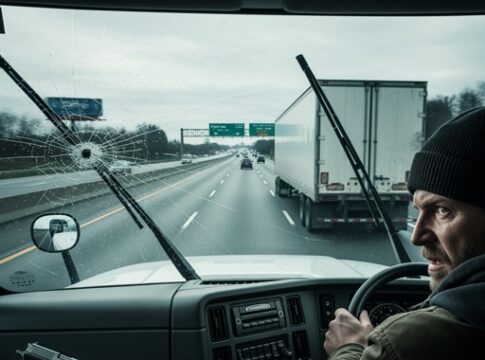One Uzbeki national, wanted for terrorism abroad, managed to become a licensed commercial truck driver in America—right under the noses of federal and state authorities—raising questions about the cracks in our national security and immigration systems that you never thought possible.
National Security Undermined by Bureaucratic Blind Spots
Akhror Bozorov, a 31-year-old Uzbek national wanted for terrorism in his home country, should have been nowhere near an 18-wheeler on American highways. Instead, he was arrested by ICE in Kansas, not for entering the country illegally, but for actively working as a commercial truck driver—legally licensed in Pennsylvania. The fact that Bozorov was able to slip through federal screening, secure work authorization, and obtain a state-issued commercial driver’s license exposes weaknesses that defy common sense and challenge the basic expectation of public safety. Critics of current immigration policies argue that this is not just a bureaucratic oversight, but a systemic breakdown whose consequences could have been catastrophic.
Policy experts point out that after illegally crossing the southern border in February 2023, Bozorov was briefly detained and then released under policies that allow migrants to await court hearings inside the U.S. Even more alarming, he later received federal work authorization, which Pennsylvania officials used to justify granting him a CDL. The chain of procedural compliance—federal release, work permit, and state license—operated as if each step existed in a vacuum, blind to the international terrorism warrant that Uzbekistan had issued for Bozorov in 2022. This seamless transit from border crosser to licensed trucker exemplifies how fragmented oversight between federal and state agencies can inadvertently transform a wanted terrorist into a commercial driver entrusted with massive vehicles on public roads.
Immigration, Licensing, and the Tug-of-War Over Public Safety
Pennsylvania, like several other states, issues commercial licenses to non-citizens who demonstrate lawful presence, relying on real-time federal database checks. In Bozorov’s case, the paperwork was in order—he had federal work authorization. Yet, neither state nor federal systems flagged his background or the international warrant, raising questions about the efficacy of current vetting processes. The Department of Transportation has repeatedly warned of dangers in licensing non-citizens without robust vetting, citing national security as a paramount concern. The Bozorov incident has provided a grim, real-world case study that underscores these warnings and has led to immediate calls for reform.
Stakeholders on both sides of the immigration debate have seized the moment. National security advocates demand tighter integration between federal criminal and immigration records and state licensing authorities. Meanwhile, proponents of more inclusive immigration policies caution against overreaction, arguing that most non-citizen drivers are law-abiding and that the trucking industry faces persistent labor shortages. Lawmakers are now under pressure to reassess the balance between economic needs and the imperative to safeguard against potential threats posed by individuals who evade proper scrutiny.
Political Fallout and the Search for Accountability
The political reverberations were immediate and intense. DHS and ICE officials publicly criticized both federal immigration policies and Pennsylvania’s licensing protocols, with statements suggesting that current systems are ill-equipped to detect and prevent the kind of security risk posed by Bozorov. Pennsylvania officials responded by emphasizing their reliance on federal verification systems, deflecting blame back to the national stage. The Biden administration faces renewed scrutiny from opponents who argue that lenient border and immigration policies are undermining public safety, a charge that resonates strongly in an election climate where national security is a perennial concern.
NEW: DHS confirms to @FoxNews that ICE has arrested an Uzbeki illegal alien wanted alleged terrorist who was driving an 18-wheeler in Kansas and had been given a CDL by the state of Pennsylvania. 31-year-old Akhror Bozorov has had an arrest warrant in Uzbekistan since 2022 for… pic.twitter.com/OVmVqO3kMi
— Bill Melugin (@BillMelugin_) November 17, 2025
Ongoing investigations are probing how Bozorov’s background evaded detection at every stage—from border entry to license issuance. Lawmakers are introducing bills to tighten vetting requirements and restrict CDL issuance to non-citizens. The trucking industry, meanwhile, braces for potential labor disruptions if new restrictions are imposed. For immigrant communities, the case heightens fear of backlash and increased scrutiny. The debate now centers on whether current safeguards are mere bureaucratic checklists or meaningful barriers to those seeking to exploit America’s openness for malicious ends.


